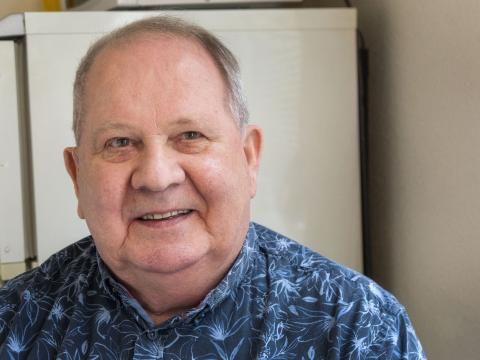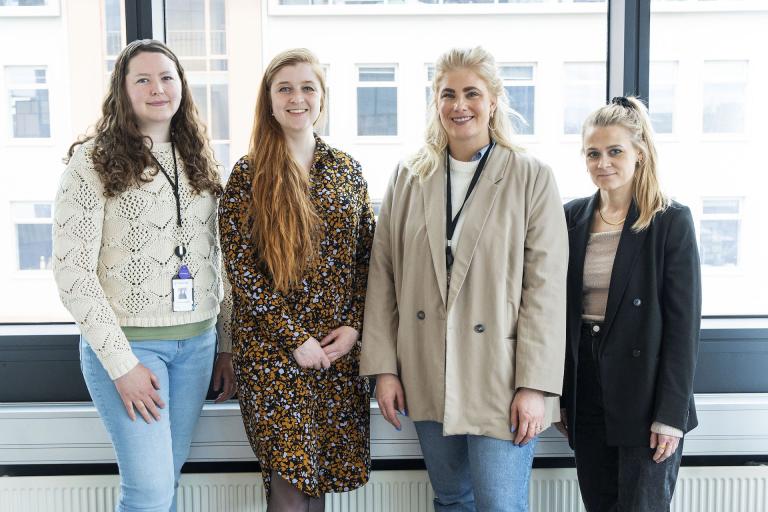"This makes you more aware of your condition"

Seventeen service users receiving home nursing now participate in a pilot project for remote monitoring of heart failure symptoms at Reykjavík City's virtual service center. The project started in January and shows promise. It's expected to last at least 12 months.
One participant is Pálmi Karlsson, an 80-year-old Reykjavík resident who has long dealt with heart failure. Monitoring symptoms is crucial.
Pálmi enjoys challenges and decided to join the project when offered. He received a blood pressure monitor, pulse oximeter, scale, and tablet at home. He now monitors his condition more closely than ever. "It's no problem, I tell you honestly," Pálmi says, confidently measuring his blood pressure and pulse. When the numbers appear, he notes, "These are a bit high for me now."
"It's no problem, I tell you honestly!"
He says he's become more disciplined since starting self-monitoring. He now measures daily, instead of weekly nurse visits. "This has made me understand my condition better and take better care of it than before," he says.
Communication via chat and video calls
Twice weekly, Pálmi completes a questionnaire on his tablet about his well-being and symptoms. He can also enter other information, such as other conditions or medications. The measurements and information Pálmi enters go into a system monitored by a nurse at Reykjavík City's virtual service center. It's staffed on weekdays from 8am to 4pm. "It's easy for service users to communicate with us through the app's chat and video calls," says Laufey Dóra Áskelsdóttir, doctor and project manager at the Welfare Technology Living Lab.

Reykjavík City's Welfare Technology Living Lab works on implementing welfare technology, innovation, and development in health and social services. The goal is to help people live longer at home with better quality of life, despite aging, disability, or illness.
Increased safety and understanding of the condition
Increased service user confidence and awareness of their condition aligns with project expectations, according to Laufey Dóra. "Some are a bit apprehensive at first, but that quickly improves when people see how user-friendly and simple it is," she says. "Overall, it's going very well, though we've had to adapt, change, and improve various things, which is typical for pilot projects. Participants have mentioned that remote monitoring increases their sense of safety and understanding of their condition."
"Some are a bit apprehensive at first, but that quickly improves when people see how user-friendly and simple it is."
What happens when measurements show deviations? "We have a clear procedure for responding. A nurse at the virtual service center starts by sending a message through the system to get more details on the person's condition and symptoms. We resolve what we can through remote monitoring and can also have a video call if the person requests. However, if we can't reach the individual by message or call, we contact home nursing, which then makes a visit. The goal is to intervene quickly if a service user seems to be worsening, and we collaborate with both the heart failure outpatient clinic at Landspítali National Hospital and Reykjavík City's home nursing regarding treatment and whether the person needs a home visit."
Remote monitoring has shown good results in Norway
The pilot project is modeled after similar projects in other countries. For example, a similar project in Norway has shown good results, with fewer hospital admissions and emergency room visits due to remote monitoring.

"We envision many people using remote monitoring in the future. We decided to start with individuals with heart failure, but remote monitoring can really suit any kind of illness or health decline that needs monitoring. Treatment plans can be tailored to each person's needs with different measurement devices, questionnaires, advice, and educational materials."
Good to know someone is monitoring
"It was good to get visits, of course, but I know they're monitoring me at the virtual service center. I regularly get messages from them, which provides a sense of security. Besides, I find this quite exciting and fun. It's good to have a task to go straight to when you wake up in the morning. I'd feel like something was missing if I didn't have this project," Pálmi concludes.

For more information, email heima@reykjavik.is or call Reykjavík City's Service Center at 411 11 11.